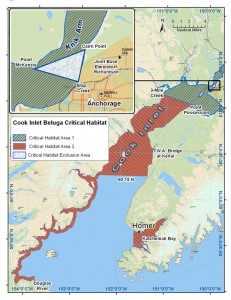
Because the Cook Inlet whales are listed as Endangered, the Endangered Species Act mandates that critical habitat be identified and a recovery plan must be developed. Mandy Migura is a marine biologist with the National Marine Fisheries Service. Migura is the NMFS liason to the recovery team tasked with developing the plan for Cook Inlet whales. She says the process is complex. It could take decades and the cost will be significant. That expense may be a major factor for the plan’s success because Migura says the requirement to write the plan is where the mandate ends.
“There is a drawback. Just because there is a recovery plan in place, that doesn’t mean that we’re necessarily going to be given the funding to implement all the actions. One of the requirements of the ESA is to develop a recovery plan, unfortunately there is no similar requirement that we will get funding to implement the recovery plan,” Migura said.
The recovery team last met in April, another meeting is tentatively planned for the fall and Migura says they hope to have a draft plan ready for review by next spring. Oil and gas producers in Cook Inlet are concerned that critical habitat designations and a recovery plan will add regulatory burdens and expense to their projects. Migura says specific actions haven’t been identified but they have made a list of potential threats and stressors.
“But they haven’t identified any specific one action at far as this being a cause or the concern. So I really don’t have the information to give you at this point in time because I haven’t seen what they’re proposing for recovery actions, to be able to know if there is a concern for any one particular industry,” Migura said.
The state of Alaska sued over the ESA listing but has not appealed a court decision upholding the listing. Doug Vincent-Lang is the state’s acting director of the division of wildlife conservation and the endangered species coordinator. He says the state also sued over the critical habitat designation citing two concerns. First the size.
“Especially the designation of the entire west side of Cook Inlet all the way down, basically to the outlet of Cook Inlet as well as Kachemak Bay. And we didn’t think that all of those areas represented critical habitat based on the primary constituent elements which are habitat elements necessary to beluga recovery that the service itself had identified,” Vincent-Lang said.
Vincent-Lang also has concerns that more regulation and the potential for lawsuits could have a dampening effect on future oil, gas and other development. He says NOAA conducted an economic impact study and the state did another. He says they were vastly different.
“We estimated the overall cost in tens of millions of dollars where they estimated it on the order of tens of hundreds of thousands of dollars per year. It’s magnitudes of orders of difference between our two estimates of economic impact,” Vincent-Lang said.
But Alaska Pacific University biologist Dr. Leslie Cornick says designating critical habitat does not mean all development ceases.
“That’s a huge misconception. It just means that if you are going to do a project, there are a series of steps that you need to take to make sure that your intended project is not going to make the situation worse for beluga whales,” Cornick said.
She says it does add more hoops and expense for developers. But she says there has to be a balance between development and nature. And she thinks many Anchorage residents would agree.
“I don’t know anyone in Anchorage who isn’t absolutely giddy when they get to pull over to the side of the Seward Highway and watch beluga whales, and we’re looking at losing that. And, you know, I think it’s more than just an aesthetic cost. It basically is another message to the ocean that we don’t care,” Cornick said.
Dr. Cornick says, not caring is a choice.
“If we don’t care about the ocean, that’s a choice that we can make, but then I guarantee you the ocean is going to stop taking care of us,” Cornick said. “And that will be a very bad day.”
Listen for the full story
Lori Townsend is the news director and senior host for Alaska Public Media. You can send her news tips and program ideas for Talk of Alaska and Alaska Insight at ltownsend@alaskapublic.org or call 907-550-8452.





